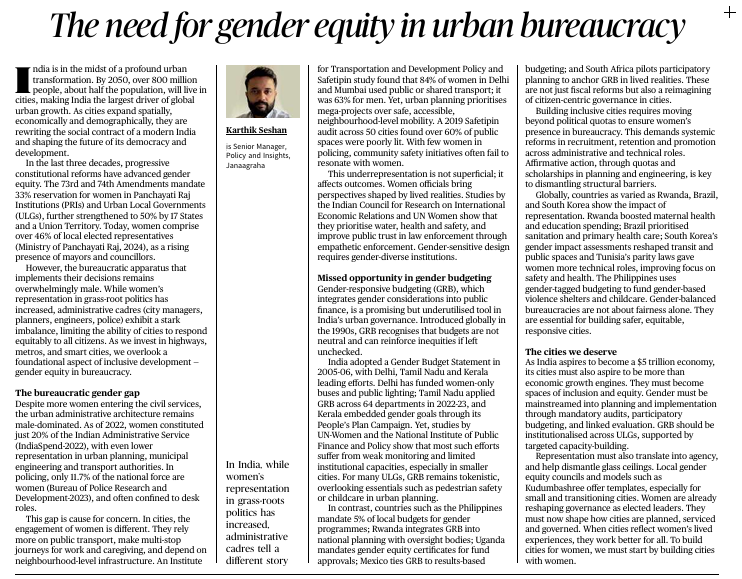1. Context and Urban Transformation
- By 2050, over 800 million people in India (~50% of the population) will live in urban areas, driving significant spatial, economic, and demographic change.
- Cities are the engines of modern governance and democracy, making equitable urban governance essential.
2. Progress in Local Governance but Not Bureaucracy
- Panchayati Raj Institutions (PRIs) have advanced gender equity via 33% reservation for women, now increased to 50% in 17 States and 1 UT.
- Over 46% of local elected representatives are now women (Ministry of Panchayati Raj, 2021).
- BUT: Urban bureaucracies remain overwhelmingly male-dominated, especially in:
- Engineering services
- Urban planning
- Police administration
- Transport departments
- Engineering services
3. Underrepresentation in Urban Bureaucracy
- Women make up only 20% of IAS officers in urban-centric services (IndiaSpend 2022).
- Even lower representation in technical roles like municipal engineering and transport.
- Studies show women officers bring different perspectives, prioritizing safety, health, and equitable services.
4. Consequences of Gender Gaps
- Biased planning outcomes:
- 84% of women in Delhi & Mumbai use shared transport but urban planning prioritizes private vehicles.
- 60%+ of public spaces in cities rated unsafe for women.
- Only 7% women in police – leading to skewed enforcement and public trust deficit.
- 84% of women in Delhi & Mumbai use shared transport but urban planning prioritizes private vehicles.
- Lack of gender equity = Ineffective service delivery + exclusion of vulnerable citizens.
5. Gender Responsive Budgeting (GRB)
- GRB integrates gender into public finance & planning.
- Ensures women’s needs are considered in budget allocations.
- India’s efforts:
- Tamil Nadu, Kerala, Delhi, and Bihar have led initiatives.
- Ministry of Housing & Urban Affairs and UN Women promote gender budgeting in Smart Cities.
- Tamil Nadu, Kerala, Delhi, and Bihar have led initiatives.
6. Global Examples of Gender Equity in Governance
- Brazil: Prioritized sanitation and health through gender-based budgeting.
- South Korea: Gender reforms improved public service delivery.
- Philippines & Tunisia: Safer cities through inclusive urban planning.
- Uganda, Kenya, South Africa: Women involved in participatory planning & budgeting.
7. Way Forward: The Cities We Deserve
- Need to institutionalize inclusive design via:
- Quotas for women in recruitment, engineering, and administration.
- Technical education access for girls.
- Leadership training in urban governance.
- Public awareness for shared decision-making.
- Quotas for women in recruitment, engineering, and administration.
- Women’s leadership ensures cities are more responsive, equitable, and safe.
🧾 UPSC-Style Questions
🔹 GS1 – Society & Social Issues | GS2 – Governance
10-Marker (150 words)
- Discuss the importance of gender equity in urban governance in the context of India’s demographic transition.


